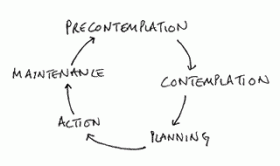Psychological Treatments
In common with other addictions, CDS is amenable to a number of psychological approaches.
The stages of change
This well-known model of behaviour change highlights the fact that change does not take place all at once, but is a multi-step process [1]. If the addict is in the pre-contemplation stage, for example, he or she does not see a need to change and simply providing advice on carbon reduction measures is likely to be ineffective [3]. It may be more helpful to explore the pros and cons of changing (e.g. Pros: feel fit and healthy; no more constipation! Cons: fewer tropical holidays).

Stages of change
Motivational interviewing
Motivational interviewing is a empathetic form of counselling widely used in addiction, which can be used to tap into the carbon addict’s own motivations [2]. The addict is encouraged to speak about her own values, notice areas where they are in conflict with her high carbon behaviours, and explore why she tolerates the discrepancy. Providing this space will often allow people to "talk themselves into change" [4] [5].
Cognitive behavioural therapy (CBT)
Unlike motivational interviewing, the authors are not aware of the use of CBT in management of carbon dependence - to date. However, qualified practitioners working with carbon addicts may wish to consider the following techniques:
- keeping a diary at significant periods (e.g. Christmas – traditionally a celebration of nvConsumption) to record thoughts and behaviours
- graded exposure to vegetables
- trying out new ways of behaving and reacting: putting on a jumper when cold
Carbon dependence self-help groups
These are springing up! Your patients may find help at:

